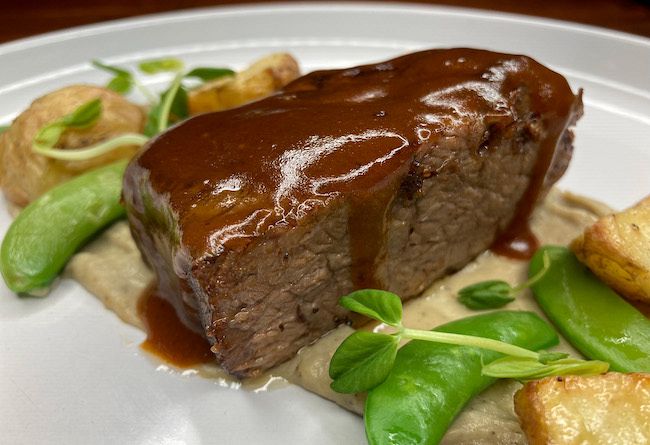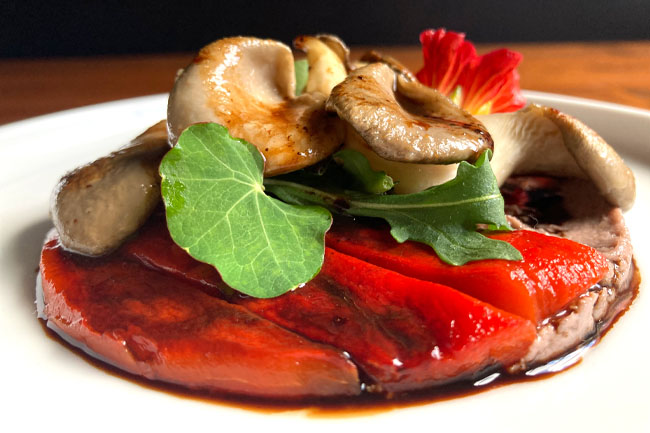Seven months into her journey with anorexia, single parent Megan Jane de Paulo talks about her uphill battle to break the bonds of the eating disorder stealing the flesh from her son's body.
*CONTENT WARNING: This article discusses eating disorders
MY 14-YEAR-OLD son has anorexia.
Every time I even think that phrase I feel a stab through my heart. Intellectually, I know I didn’t cause my son’s illness. I have – due to my own experiences as a teenager – been very conscious about never commenting on his body, never restricting food, not cutting anything like sugar but talking about moderation when having treats and so on.
The guilt is there, however, always. From even before the moment he emerged I was focused on nourishing him — avoiding certain foods, taking vitamins and making sure I ate well.
Despite issues with breastfeeding, I pumped milk for as long as physically possible to give him what I was told was “the best start in life”. I homemade all his baby food. I packed delicious, healthy lunches for him to take to school. I’ve stayed up until the wee hours of the morning learning how to make fondant in sweltering Cairns autumn to surprise him with the perfect Kamen Rider birthday cake.
I have always cooked healthy, saliva-inducing food to present to him at meals. In my case, in particular, food has always been a love language. Meal times where we are together. Eating. Chatting. Enjoying.
My son doesn’t want to eat anymore. Food makes him feel unwell. He expresses a hope for some magic pill he can take for fuel and avoid it altogether.
There’s no magic pill. Just me, a single parent, desperately and constantly trying to tempt him to nourish his body, his mind. To relieve him of the hunger, the illness he feels, to give him the energy to go to school and participate in activities. To enjoy his life.
We are roughly seven months into our journey with anorexia. While that sounds like a long time, for most teenagers and parents this is a battle over many years. It takes a while before either of you really know this is happening — little red flags popping up until it’s revealed by changes in physique and behaviour.
Looking back I can see the red flags I missed. His obsession with the body-positive movement. Becoming pickier about food. Sudden increases in exercise. Nothing, in particular, that would make you think, “eating disorder”.
I knew it was likely when I found the secret hidden bottles of vomit in his wardrobe and in the garden. Residue in the bathroom sink. Taking his dinner away from the table to eat while he “talked to friends on the computer”. Refusing meals because he claimed he wasn’t hungry.
It wasn’t bullying or social media that started my son’s illness — it was puberty. He couldn’t cope with the changes and started dieting to “fix” them.
We are in Melbourne. We’ve spent a lot of the past two years in lockdown. For about 262 days in fact — the two of us together, constantly; any outside interaction a relief from our 24-hour confinement together, working and studying side by side. Both of us ate separately sometimes, chatting to people on the "outside", or watching a show the other wasn’t interested in. I didn’t reinforce strict mealtimes and rules and that continued after the lockdown ended.
See what I mean about the guilt? You literally question every move you’ve made pre-diagnosis.
It wasn’t bullying or social media that started my son’s illness — it was puberty. He couldn’t cope with the changes and started dieting to “fix” them.
He started to look thinner. Even worse he was thrilled to be looking thinner. But his most obvious weight loss occurred between the time of the initial diagnosis and the beginning of treatment.
After complaining about having a bloated tummy and tummy aches for a while, I convinced him to see a doctor. I thought at this point that he was suffering from anorexia, but I concealed my suspicions from him somewhat.
I tried to get him to our regular GP for several weeks and he had point-blank refused, so when he consented, finally, I dragged him immediately to whichever clinic had someone available.
The doctor asked us a few questions, gave him a physical check and told us straight, “I think you have anorexia”. Neither of us was surprised — but now my son had an opinion from a medical professional and for us, that meant he was open to finding out more. Our regular GP confirmed the first diagnosis. She ordered blood tests and an electrocardiogram (ECG). Thus began our medical rollercoaster ride.
An incredibly unpleasant technician at the pathologist set us back two weeks with her attitude. My son refused to return claiming he was too unwell to go. We eventually got over that hurdle with the help of a more pleasant person, but even she questioned the tests our GP had asked for: “He’s a beautiful boy! He looks fine.” I bit my lip, knowing that he wasn’t even getting 1,000 calories per day.
The GP tried to get us into one program. We were rejected. Rinse, repeat. New rounds of tests. New applications. It was a relief when The Alfred Hospital accepted us into the Eating Disorders Program at its Child & Youth Mental Health Service (CYMHS).
Things moved quickly after that. Now, weekly, we have a series of appointments with different specialists.
There’s no deadline. No end date. No magic weight goal. You don’t get cured of anorexia. You just successfully hold it at bay.
Anorexia is a disease of the body and mind
You can’t tackle one aspect without addressing the other. My son's treatment addresses this. Therapists. Dietitians. Everyone has been compassionate and helpful. Some speak from their experience of working with eating-disorder patients, some from personal experience with the diseases themselves.
There’s a carer support person, but I don’t know her very well. I don’t make it to those zoom meetings because there are other appointments or issues to tackle at that time. If there is one thing I’m failing at, it’s self-care. While I will literally stab the next person who tells me “you have to fit your oxygen mask before you fit another person’s” in the eye, the truth is, his anorexia has become my disease, too.
I don’t eat regularly. If there is something I’ve made that my son has enjoyed eating I will give all of it to him and have a cheese sandwich. Meal planning focuses on preparing food he might want to eat.
Some acquaintances who hadn’t seen me in a while (but knew about the anorexia diagnosis) asked me if I’d lost weight because I was looking good. FFS, don’t ever say that to the parent of someone with anorexia. It’s likely they are struggling with eating themselves and are highly stressed — not because of some benefit from a health kick.
I don’t sleep properly. The kitchen is always open. I make udon noodles at 1 am since his sleep pattern is so out of whack right now. Even when I crash from exhaustion, I’m often woken up at around 4 am from the sounds of him exercising.
Days are filled with appointments or making appointments. Paperwork. Trying to navigate support systems. Researching the disease. Reading others' accounts of potential solutions — and heartbreaking struggles.
I am anorexia's "personal assistant". I loathe this and still accept that it has to be this way.
Anorexia is an external enemy constantly whispering to my son: 'Don’t listen to her. You don’t need food. Let’s exercise more.'
Doing "okay”
People, kindly, say: "You're a good mum", “You’re so strong” and “You’re doing an awesome job!”
In my head, roughly 50 times a day, I scream “just fucking eat!" at my son. “Please just eat so that I don't have to cope with this anymore. Please. I have so much to deal with. I am so fucking tired."
Anorexia doesn’t work that way. Anorexia is an external enemy constantly whispering to my son: “Don’t listen to her. You don’t need food. Let’s exercise more.”
Anorexia is stealing the flesh from my son’s body. Stealing a normal teenage life of school, activities and friends. Stealing time. Stealing him from me.
Daily, I gnaw at the bonds anorexia has entwined him in. A meal consumed, possibly enjoyed and kept down. A weight gain on the scales. A time he’s enjoyed with a friend. A day when he manages to get to school and stay a whole day.
Things I’ve apparently done okay at:
- transparency — I tell my son what’s happening and what the plans are, however, this approach doesn’t work for all children;
- communication — we’ve always had decent communication, luckily, so I haven’t experienced the full-on deception anorexia often causes; and
- respect — I always ask permission from my son to share information with health professionals or others and I am not allowed to post his picture anywhere online or refer to him by name online in public, and we are careful to let each other speak in therapy sessions.
Schedules and school — a return to normal
School is important because it provides structure — a structure for meal times and sleep times. It can be very difficult to get teenagers back on track with routine (especially post lockdowns). But getting kids back to school takes the pressure off them and provides a chance to socialise.
My son’s school has been helpful so far and is willing to work with us and the CYMHS on his treatment.
Treatment of anorexia – at its most basic – involves re-feeding. Three meals and three snacks a day. Yes, you might as well ask me to piggyback my teenager up Mt Everest. We have a modified version since he’s currently gained a little weight, even with my haphazard approach, but this is still the biggest hurdle.
Nourish. Break the ties to anorexia. Reverse the effects on body and mind — treatment seems to rest on this.
I think my kid has an eating disorder?
Don’t consult "Dr Google". Organisations like Butterfly Foundation have information and a quiz to help you. Next up, your family GP is your best ally.
How can friends and family help
Perhaps, don’t offer advice. I know you are trying to be helpful and kind. Most parents of children with eating disorders spend an incredible amount of time researching, talking to medical professionals and discussing issues in support groups.
You might like to give a gift certificate to a store or supermarket. Families dealing with anorexia go through a huge amount of food trying to accommodate an ill young person. Or it might help to put some credit towards a delivery meal through a delivery service so they can have a break and order something you know their kid likes.
More than "normal" teenagers, kids with eating disorders change clothes and uniform sizes rapidly. Uniforms are stupidly expensive and many anorexia teenagers are incredibly particular about "fit" and won’t go to school if it’s wrong.
Anorexic kids don’t have enough body fat to keep warm — even with heaters on. So, soft blankets and "oodies" are helpful.
Anorexia affects skin and hair — which makes anorexic kids feel worse about their appearance. Tread carefully about hair loss — arranging a mobile hairdresser to help at home would be more thoughtful than offering a salon appointment.
Perhaps consider donating to organisations such as Butterfly Foundation or Eating Disorders Families Australia (EDFA).
"Play-dates"
How we’ve handled “play-dates” (for goodness sake, don’t let teenagers hear you use that word or they’ll throw sarcasm at you) is to talk to other parents and leave it up to them to explain what’s happening to their child's friend.
At another child's house, my son won’t eat for fear of being sick. But play-date parents can offer snacks, like normal. He will be fed at home. He will not eat outside in a restaurant. He won’t have the energy to hang out for a long time.
As for other friends, my son told them what was happening himself and, fortunately, they’ve all been pretty supportive so far.
How does this end?
I hope it ends in recovery without too much damage to him, or me.
I hope we can turn this around before we go further down the path — toward hospitalisation, self-harm, suicide attempts and forced feeding.
I hope he can return to a normal teenage life.
I hope we come out of this still loving each other.
I hope.
If you would like to speak to someone about eating disorders you can call Lifeline on 13 11 14 or Kids Helpline on 1800 551 800.
Megan Jane de Paulo is a Melbourne-based, inner-city latte sipper and social media provocateur. You can follow Megan on Twitter @gomichild.
 This work is licensed under a Creative Commons Attribution-NonCommercial-NoDerivs 3.0 Australia License
This work is licensed under a Creative Commons Attribution-NonCommercial-NoDerivs 3.0 Australia License
Support independent journalism Subscribe to IA.












